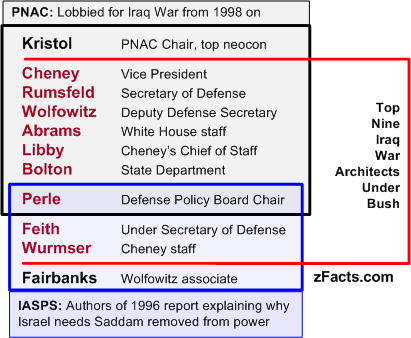July 14, 2006
Israel Crosses the LineAnd you read it here first…
by Justin Raimondo
The Israeli offensive against Iran – until now, purely polemical – morphed into military action the moment the IDF crossed the border into Lebanon and took on Hezbollah. As our regular readers know, this turn of events was predicted in this space three months ago:
"War with Iran will probably not begin with a frontal assault by the U.S. and/or Israel on Iran's alleged nuclear weapons facilities, or even a skirmish along the Iraq-Iran border. Look to Lebanon and Syria for the first battlegrounds of this developing regional war. The Israelis know perfectly well that Iran's nuclear ambitions, if they ever materialize, are not an immediate threat: their real concern is their volatile northern border, where their deadly enemies – Hezbollah – are an effective obstacle to Israeli influence. The Israelis are also looking to exploit growing opportunities to make trouble in Syria, where the restive Kurds are their reliable allies, and the brittleness of the Ba'athist dictatorship is an invitation to regime change."
The suggestion, by Professors John J. Mearsheimer and Stephen Walt, in their now famous "The Israel Lobby and U.S. Foreign Policy," that the Iraq war was fought for Israel's sake, and against our own interests in the region, was received in many quarters with outright horror, and not only from the Amen Corner. Noam Chomsky and Stephen Zunes both objected to this thesis of an Israel-centric foreign policy: Israel, they insist, is the "junior partner" of the American hegemon, and is only acting at the behest and under the de facto control of its masters in Washington.
The war's aftermath, however, tells a different story. Examined in light of Israel's postwar actions – the unilateral "withdrawal" from Gaza, the absorption of more territory and the building of more settlements on the West Bank, the war against Hamas, and now the re-invasion of Lebanon – the chief (and only) beneficiary of the new regional balance of power is clear enough. The American invasion and occupation of the Mesopotamian heartland has empowered the Israelis as never before – and now they are on the offensive, carving out a greatly expanded sphere of influence extending into Kurdistan as well as Lebanon, bringing closer to fulfillment the old Zionist vision of an empire stretching "from the Nile to the Euphrates."
The U.S., on the other hand, has considerably reduced leverage in the region. Our troops in Iraq are exposed, vulnerable to the Iranians – and stalemated by the Iraqi insurgency, which shows troubling signs of extending into Shi'ite areas. As the Israelis advance, with American support, Sunni and Shi'ite factions in Iraq – including those in the governing Shi'ite coalition – are radicalized, and turn their fire on the Americans.
Yet the U.S. is still shilling for the Israelis, blaming Syria and Iran for acts that occurred well outside the purview of the mullahs and the increasingly isolated regime of Bashar al-Assad. Meanwhile, in the UN, we are bringing the issue of Iran's nuclear power program to the Security Council, pressing for a confrontation that can only end in $200-per-barrel oil.
In 1996, a group of pro-Israeli Americans – including Richard Perle, James Colbert, Charles Fairbanks Jr., Douglas Feith, Robert Loewenberg, David Wurmser, and Meyrav Wurmser – prepared a policy statement for then-Prime Minister Benjamin Netanyahu that proposed a strategy of regime change as the only solution for Israel's growing encirclement and isolation. The main problem, they averred in "A Clean Break: A New Strategy for Securing the Realm," was Syria, and the troublesome border with Lebanon:
"Syria challenges Israel on Lebanese soil. An effective approach, and one with which American can sympathize, would be if Israel seized the strategic initiative along its northern borders by engaging Hizballah, Syria, and Iran, as the principal agents of aggression in Lebanon."
But this could occur only if Iraq was taken out first:
"Israel can shape its strategic environment, in cooperation with Turkey and Jordan, by weakening, containing, and even rolling back Syria. This effort can focus on removing Saddam Hussein from power in Iraq — an important Israeli strategic objective in its own right — as a means of foiling Syria's regional ambitions."
With Saddam out of the way, the second phase of the "Clean Break" scenario is unfolding before our eyes. And the propaganda war is going just as well as the military aspect of the campaign: the Israelis are no fools. They realize they can't proceed without the tacit complicity of the U.S. and the Europeans, who must be made to look the other way as the IDF commits war crimes on the ground. Under the pretext of avenging the "kidnapping" of one of their soldiers – and, more recently, two more – they have unleashed a military assault planned well in advance of the allegedly precipitating incidents.
This is surely one of the most threadbare excuses for a war ever uttered. One wonders how Israel's spokesmen can say it with a straight face. Soldiers in wartime are captured, not "kidnapped." If Hezbollah has "kidnapped" those two Israeli soldiers, then how do we describe the jailing of thousands of Palestinians, including hundreds of women and children, on the basis of their alleged sympathy for Hamas – now the democratically elected government of Palestine? In any case, it appears, according to this report, that Hezbollah has some Israeli competition when it comes to the business of kidnapping.
The Bush administration is formally committed to the "road map," which entails the creation of a Palestinian state. Yet the Israelis have done everything possible to undermine Bush's plan, including obstructing elections. The American response has been appeasement: as Israeli gunboats make short work of Gaza beach-goers, Washington's response is to demand the unconditional release of captured Israeli soldiers. There is an undertone of disapproval, as Condoleezza Rice urges "restraint" by all parties and the president worries that the Lebanese government will be destabilized, yet none of this is allowed to deflect U.S. policymakers from their craven course of kowtowing to the Israelis while they spend our money and earn us plenty more enemies among the world's billion-plus Muslims.
Israel's fifth column in America has been enormously successful in "spinning" the latest news from the Middle East. Instead of reporting that Israel is invading Lebanon, the "mainstream" media avers that Israel has "entered" Lebanon – as casually as one would enter a room in one's own house. The first few paragraphs of many news stories describe the latest attacks on Israeli targets and accounts of the damage done, while, five paragraphs down, we finally get word that 55 civilians have been killed by the latest Israeli aerial bombardment of Lebanon.
The Mearsheimer-Walt thesis – that U.S. foreign policy has been hijacked (kidnapped, if you will) by what they refer to as "the Lobby" – has so far been confirmed by the events of the past few days. The United States is giving what appears to be unconditional support to phase two of the "Clean Break" plan, targeting Syria and Iran, albeit while cautioning the Israelis on Lebanon.
The Israelis, outraged by what they regard as foot-dragging in Washington, are forcing Uncle Sam's hand. If we won't fire the first shots of World War IV, then they are perfectly willing to do so – confident that we'll follow them blindly into the maelstrom.
Whether the Bush administration will go all the way with the Israelis on this one, is, however, in some doubt. The alleged triumph of the Republican "realists" over the neoconservatives, supposedly symbolized by the ascension of Condi Rice, is counteracted by the Democrats' complete subservience to the Lobby. Already Hillary Clinton is denouncing the administration for "appeasing" Iran, and the sudden reappearance of the neocons in Democratic Party circles is indicative of what is going on here. Foreign policy is merely a reflection of domestic political pressures – which, in this case, surely do not represent either the views or the interests of the American people.
Mearsheimer and Walt explain how we got into this mess, but they don't give us any answers about how to get out. How do we avoid getting dragged by our Israeli "allies" into World War IV?
The short answer: stop appeasing Israel – and start looking out for American interests. The Amen Corner makes no such distinction, but clearly there is one, the most obvious being that we (unlike the Israelis) have no interest fomenting a wider war – especially while our troops are stuck in the middle of it all, lined up like sitting ducks and increasingly on the defensive.
The U.S. must unequivocally condemn the invasion of Lebanon and call for the unconditional withdrawal of all Israeli forces from Lebanese soil. Furthermore, the naval and aerial blockade of Lebanon must end: thousands of tourists and others are pouring into Syria, where they may not be safe for very much longer. This is an intolerable act of war against the whole civilized community, and for the United States government to not only stand by but implicitly condone it is unforgivable. The "war on terrorism" apparently requires enabling Israeli state terrorism.
The regional conflict widely predicted as one of the more horrific consequences of the Iraq invasion is now breaking out. The only rational response is to get out of the way before we are drawn in. Like a summer fire in the American West, if it isn't contained, the flames of the rapidly spreading conflict will soon be licking at our door. And we are bound to be choking, sooner rather than later, on the economic fallout – another factor that could embolden the Democrats to keep up their effort to outflank the GOP on the war question from the right.
As both parties fall into lockstep behind the Lobby, and American power and prestige are once again harnessed to Israeli interests, there is little hope that Congress will step into the breach and stop our headlong plunge into World War IV. Nor do any of the likely presidential candidates seem willing to take on the War Party when the question of war and peace is put in terms of Israel's interests – or, as the Lobby would have it, the Jewish state's continued survival. Here is a war they can sell by confronting critics with a simple question: What are you, some kind of anti-Semite?
Years of relentless propaganda, countless smear campaigns, and a prodigious expenditure of money and human resources led us to this moment: the War Party is launching what amounts to its final offensive, an all-out attack on whatever bastions of human decency and common sense remain in this hideously war-crazed post-9/11 world. Come what may, we at Antiwar.com will stand at our posts, pouring hot molten editorials down on the enemy – and giving you the best, most accurate reporting on events in the Middle East anywhere on the Internet, or anywhere else, for that matter.
Find this article at: http://www.antiwar.com/justin
Subscribe to:
Post Comments (Atom)







No comments:
Post a Comment